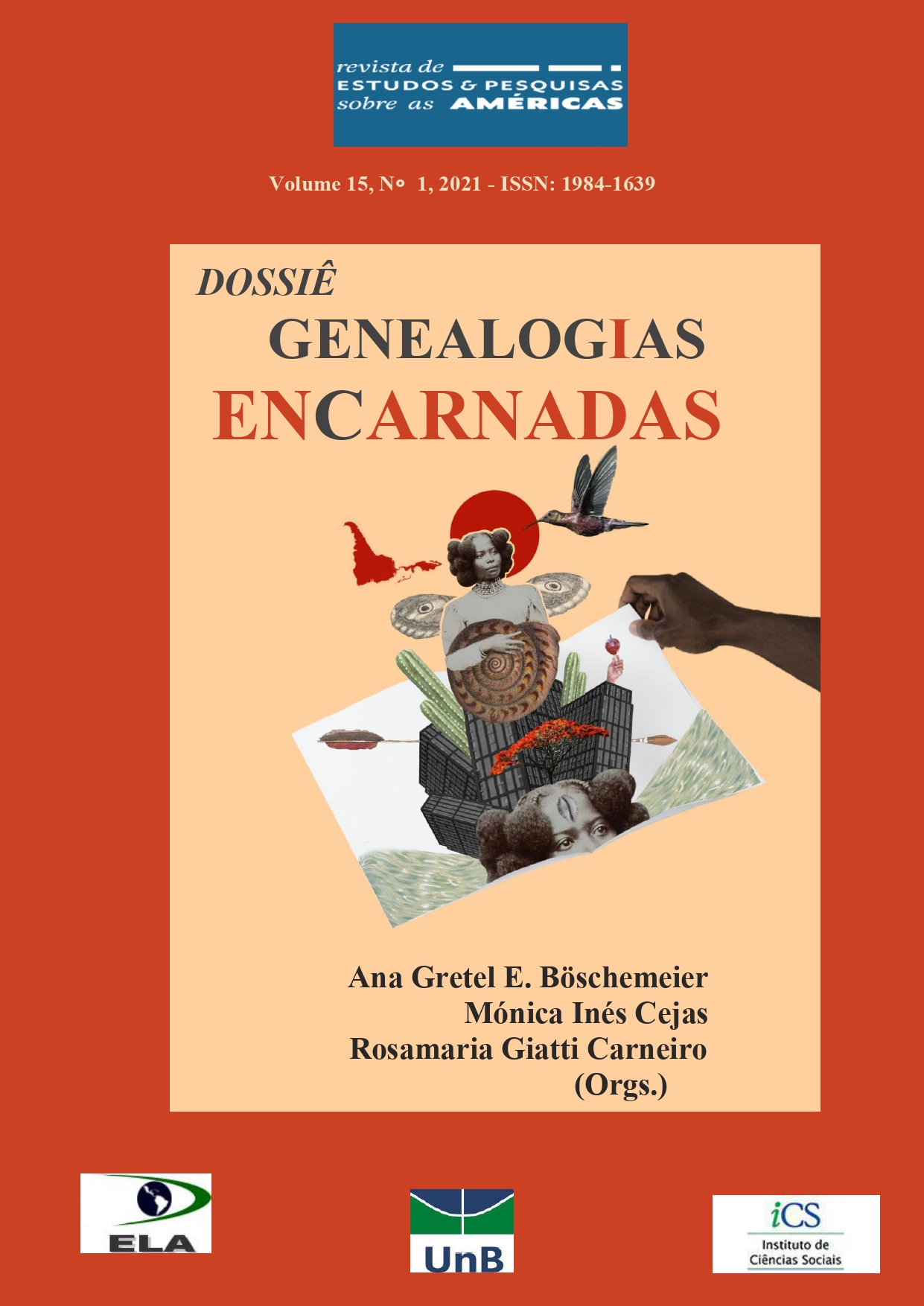Introduction to the dossier Genealogies of a Latin American Thought Incarnated: Writings of one another, in and on an inhabited territory
DOI:
https://doi.org/10.21057/10.21057/repamv15n1.2021.40443Abstract
Introduction to the dossier Genealogies of a Latin American Thought Incarnated: Writings of one another, in and on an inhabited territory
Downloads
References
APPIAH, Kwami Anthony. 2000. Thick translation. Em: Lawrence VENUTI, The translation studies reader. London: Routledge. p. 417-429.
BELLI, Gioconda. 1988. La mujer habitada. Iruñea: Txalaparta.
CARVALHO, José Jorge de. 2018. Encontro de Saberes: por uma refundação étnica, racial e epistêmica das universidades brasileiras. In: BERNARDINO-COSTA, Joaze, Nelson MALDONADO TORRES e Ramón GROSFOGUEL (orgs.). Decolonialidade e pensamento afrodiaspórico. Belo Horizonte: Autêntica, 2018, p. 79-106.
CORONA BERKIN, Sarah. 2007. Entre voces… fragmentos de educación entrecultural. Guadalajara: Universidade de Guadalajara.
CRENSHAW, Kimberlé. 1991. Mapping the Margins: Intersectionality, Identity Politics, and Violence Against Women of Color. Stanford Law Review, 43, p. 1241-99.
ECHAZÚ BÖSCHEMEIER, Ana Gretel et al. 2020. A tradução de Zora Neale Hurston para o cânone antropológico: Práticas de extensão desde uma perspectiva feminista e interseccional. Mutatis Mutandis. Revista Latinoamericana de Traducción, v. 13, n. 2, p. 228-254.
ECHAZÚ BÖSCHEMEIER, Ana Gretel et al. Waman Poma de Ayala, um autor indígena do século XVII: questionando antropocentrismos no colonialoceno. Em vias de publicação, 2021.
ERICKSON, Sandra e Ana Gretel ECHAZÚ BÖSCHEMEIER. 2021. Apresentação: Zora Neale Hurston, Textos Escolhidos e Traduzidos. Fire!!! Textos escolhidos de Zora Neale Hurston (Edição Especial) Ayé: Revista de Antropologia. /Colegiado de Antropologia da Universidade da Integração Internacional da Lusofonia Afro-Brasileira, Acarape, v.1, n.1, p. 4-44.
ENLOE, Cynthia 2004. The Curious Feminst. Searching for Women in a New Age of Empire. Berkeley y Los Ángeles: University of California Press.
ESCALANTE, Emilio del Valle. 2014. Self determination: a perspective from Abya Yala. 20 mai. 2014 (ESCALANTE, Emilio del Valle. Disponível em: https://www.e-
ir.info/2014/05/20/self-determination-a-perspective-from-abya-yala/ Acesso em 23 mai. 2021
ESPINOSA-MIÑOSO, Yuderkys. 2014. Una crítica descolonial a la epistemología feminista crítica. El Cotidiano, marzo-abril.
_______Hacer genealogia de la experiencia: el metodo hacia una critica a la colonialidad de la Razon feminista desde la experiencia historica en America Latina. In: Revista Rev. Direito Práx. Rio de Janeiro, Vol. 10, N.03, 2019 p. 2007-2032. DOI: 10.1590/2179-8966/2019/43881| ISSN: 2179-8966
EVARISTO, Conceição. 2016. Becos da memória. Belo Horizonte: Mazza.
GONZÁLEZ, Lélia. 2021 [1988]. A categoria político-cultural de Amefricanidade. Em: Flávia RIOS e Márcia LIMA, Por um feminismo afro-latino-americano. Ensaios, intervenções e diálogos. Rio de Janeiro: Zahar. pp. 115-125.
KRENAK, Ailton. 2020. O amanhã não está à venda. São Paulo: Companhia das Letras.
LEVINS MORALES, Aurora. 2019. Certified Organic Intellectual. Em: Medicine Stories. Essays for Radicals. North Carolina: Duke University Press. pp. 121-126
LUGONES, María. 2003. Pilgrimages/Peregrinajes: Theorizing Coalition against Multiple Oppressions, Lanham, MD: Rowman & Littlefield.
MARCOS, Silvia. 2019. Espiritualidad indígena y feminismos descoloniales. In: Ochoa Muñoz, Karina (org.), Miradas en torno al problema colonial - pensamiento anticolonial y feminismos descoloniales en los sures globales. Cidade do México: Akal. p. 119-113.
MBEMBE, Achille. 2018. Necropolítica. 3a. ed. São Paulo: n-1 edições.
NOSSACK, Hans Erich. 1992. Translating and being translated. Em: Rainer SCHULTE e John BIGUENET, Theories of translation. An anthology of essays from Dryden to Derrida. Chicago: University of Chicago Press.
RIBEIRO, Djamila. 2017. O que é lugar de fala? Belo Horizonte: Letramento/Justificando.
RIVERA CUSICANQUI, Silvia. 2019. “Temos que produzir pensamento a partir do cotidiano”. Entrevista. Em: https://noticiasanarquistas.noblogs.org/post/2019/03/08/bolivia-silvia-rivera-cusicanqui-temos-que-produzir-pensamento-a-partir-do-cotidiano/. Acesso em 20-06-2020.
RIVERA CUSICANQUI, Silvia. 2010. Violencias (re)encubiertas en Bolivia. La Paz: Editorial Piedra Rota.
RIVERA CUSICANQUI, Silvia. 2010. Ch’ixinakax utxiwa. Una reflexión sobre prácticas y discursos descolonizadores. Buenos Aires: Tinta Limón, 2010. Pinturas. 80 pp.
SOUSA ARAÚJO, Cibele et al. 2019. Apresentação do Dossiê “Estudos da Tradução & Mulheres Negras à luz do deminismo”. Em: Revista Ártemis, vol. XXVII nº 1; jan-jun. p. 2-13.
SPIVAK, Gayatri Chakravorti. 2000. The politics of translation. Em: Lawrence VENUTI, The translation studies reader. London: Routledge. pp. 397-416.
SPIVAK, Gayatri Chakravorti. [1988] 2010. Pode o subalterno falar? Belo Horizonte: Editora da UFMG.
Downloads
Published
How to Cite
Issue
Section
License
Copyright (c) 2021 Rosamaria Giatti Carneiro

This work is licensed under a Creative Commons Attribution-NonCommercial 4.0 International License.
The published material is the property of the Journal, and may be reproduced in whole or in part with indication of the source.
Copyright: Authors will be responsible for obtaining the copyright of the material used. Authors who publish in this journal agree to the following terms:
a)Authors retain the copyright and grant the journal the right of first publication, with the work simultaneously licensed under
the Creative Commons Attribution License which allows the sharing of work with acknowledgment of authorship and initial publication in this journal.
b) Authors are authorized to take additional contracts separately, for non-exclusive distribution of the version of the work published in this journal (eg, publish in institutional repository or as a book chapter), with acknowledgment of authorship and initial publication in this journal.
c) Authors are allowed and encouraged to publish and distribute their work online (eg in institutional repositories or on their personal page) at any point before or during the editorial process, as this can generate productive changes as well as increase the impact and the citation of the published work (See The Effect of Free Access).


















